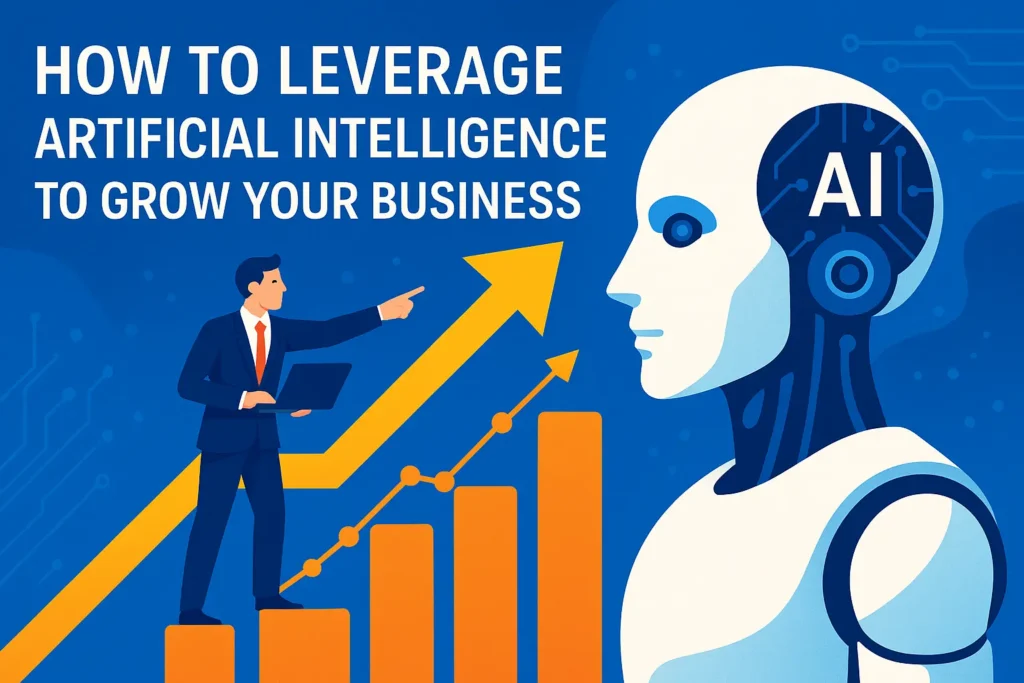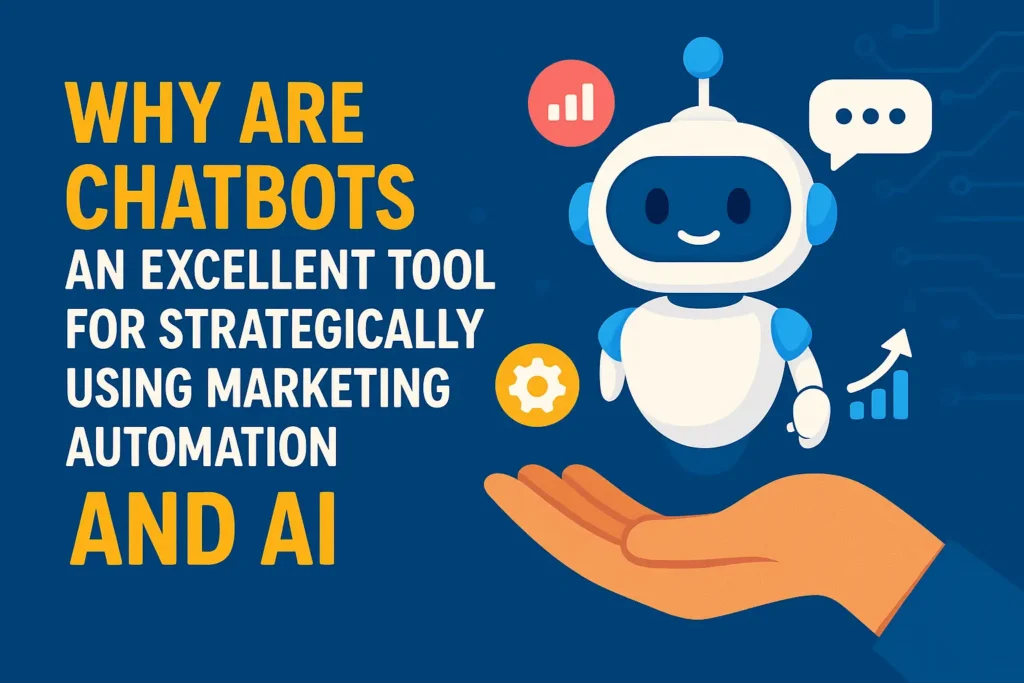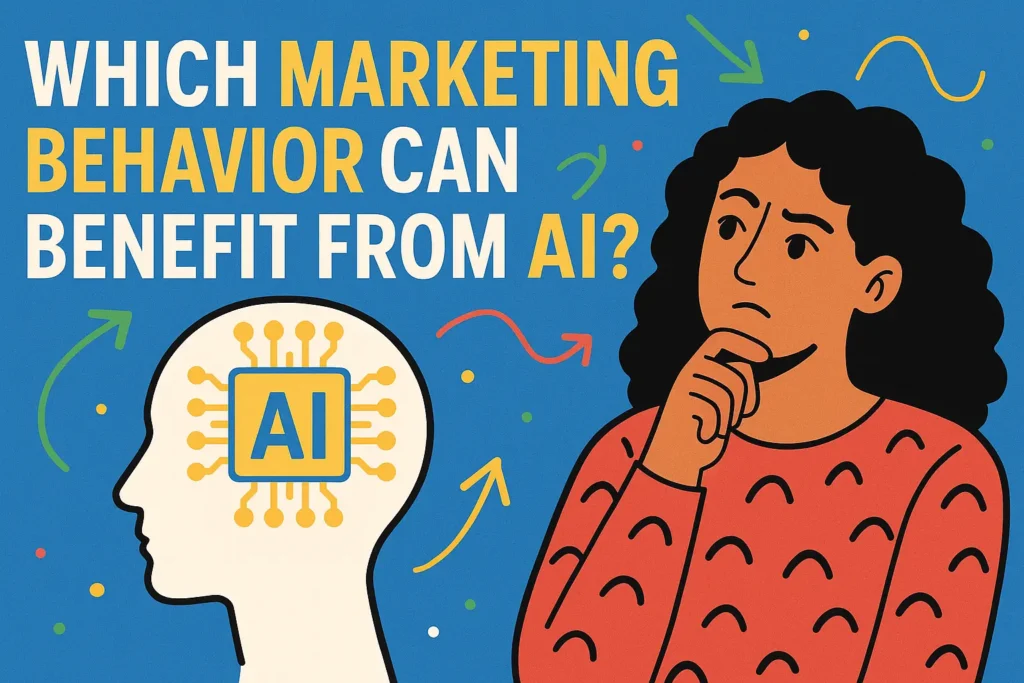Artificial Intelligence (AI) is not just a buzzword—it’s transforming the marketing landscape at lightning speed. In 2025, businesses that leverage AI in marketing will see better ROI, more innovative strategies, and deeper customer connections than ever before.
Whether you’re a startup, mid-sized business, or an enterprise brand, understanding and implementing AI in your marketing strategy is essential to stay ahead of the competition.
What is AI Marketing?
AI marketing uses artificial intelligence technologies to automate, enhance, and analyse marketing efforts. It involves machine learning, natural language processing, data analysis, and other AI techniques to make data-driven decisions, predict trends, and engage with customers on a deeper level.
💡 Stat Alert: According to Statista, the global AI in marketing market size is projected to reach $107.5 billion by 2028, growing from just $15.8 billion in 2021.
Benefits of Using AI in Marketing
Below are the benefits of using AI in marketing:
- Higher Return on Investment (ROI): AI-driven campaigns optimise ads, personalise emails, and predict user behavior—helping marketers spend smarter and see more substantial returns.
Example: Netflix’s AI-driven recommendation engine saves the company $1 billion annually in value from customer retention. - More Accurate Measurement of KPIs: AI can track and measure key performance indicators in real time, giving marketers a clear view of what’s working and what’s not.
- Improved CRM Capabilities: With AI, customer relationship management tools can automate follow-ups, personalise interactions, and predict when a lead is ready to convert.
- Deeper Insights from Customer Data: AI can sift through massive datasets to identify patterns, customer preferences, and buying behaviors that would take humans weeks to find.
AI in Marketing Use Cases
Here’s how to leverage AI in marketing across different areas of your strategy:
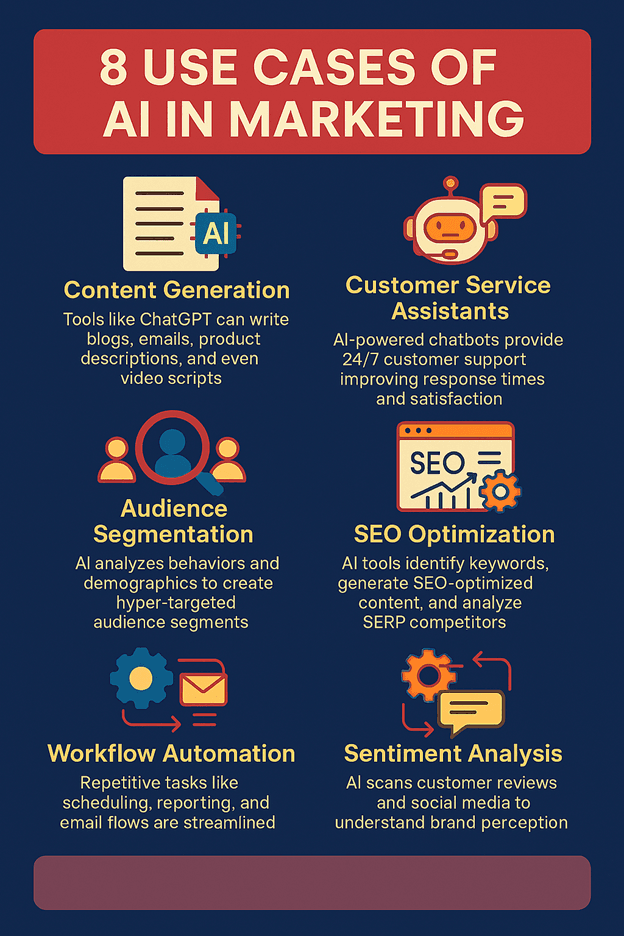
| Use Case | How It Helps |
|---|---|
| Content Generation | Tools like ChatGPT can write blogs, emails, product descriptions, and even video scripts. |
| Customer Service Assistants | AI-powered chatbots provide 24/7 customer support, improving response times and satisfaction. |
| Audience Segmentation | AI analyses behaviors and demographics to create hyper-targeted audience segments. |
| Predictive Analytics | AI forecasts customer actions like churn, buying trends, and campaign success. |
| SEO Optimization | AI tools identify keywords, generate SEO-optimized content, and analyse SERP competitors. |
| Programmatic Advertising | AI automates ad buying based on data, ensuring better targeting and budget use. |
| Workflow Automation | Repetitive tasks like scheduling, reporting, and email flows are streamlined. |
| Sentiment Analysis | AI scans customer reviews and social media to understand brand perception. |
Best Practices for Using AI in Marketing
Below are the best practices for using AI in marketing:
- Start with a Clear Objective: Define what you want AI to help you achieve—lead generation, customer engagement, or performance tracking.
- Use Clean, High-Quality Data: AI is only as powerful as the quality of the data it’s trained on. Ensure your CRM and analytics platforms are updated and accurate.
- Blend AI with Human Creativity: While AI can automate and optimise, creative storytelling still needs a human touch.
- Test and Optimize Continuously: Use A/B testing with AI tools to refine campaigns and get better results over time.
- Ensure Transparency and Ethics: Use explainable AI tools and avoid biases in data that could affect outcomes.
Guide to Incorporating AI into a Marketing Strategy
Below are the steps to incorporate AI into a marketing strategy:

Step 1: Assess Your Current Marketing Workflow
Identify manual tasks and areas with performance gaps.
Step 2: Set Clear KPIs
Use SMART goals (Specific, Measurable, Achievable, Relevant, Time-bound) to guide your AI integration.
Step 3: Choose the Right AI Tools
Consider tools like:
- Jasper.ai for content
- HubSpot for marketing automation
- ChatGPT for ideation and customer support
- Hootsuite Insights for social sentiment
Step 4: Train Your Team
Offer training on using AI platforms and interpreting AI-generated insights.
Step 5: Pilot Projects
Start small with email automation or audience segmentation before scaling.
Step 6: Evaluate and Scale
Measure results, gather feedback, and scale successful initiatives.
Examples of What AI Can Do for Your Marketing
- Write product descriptions customised to different buyer personas.
- Automate email campaigns triggered by user behavior.
- Generate SEO content based on real-time trends and search volumes.
- Monitor brand mentions across platforms using sentiment analysis.
Predict customer churn and suggest retention strategies.
📊 Stat: According to McKinsey, AI personalisation can increase marketing campaign ROI by up to 30%.
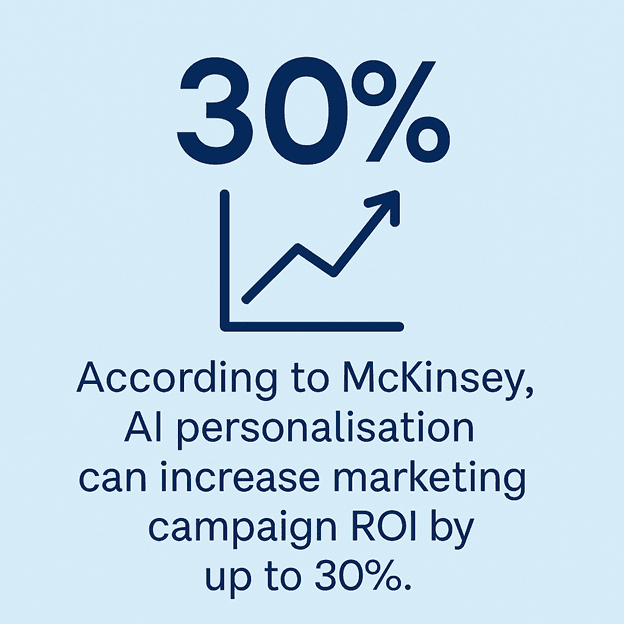
Challenges of Implementing AI in Marketing
- Data Privacy Concerns: Ensure GDPR, CCPA, and other compliance standards.
- Initial Cost of Implementation: Investing in quality AI tools can be expensive.
- Lack of Expertise: Many teams lack the training to leverage AI fully.
- Over-reliance on Automation: AI should enhance, not replace, human creativity.
Choosing AI Platforms for Marketing
When selecting tools, consider:
- Ease of Use
- Integration Capabilities
- Scalability
- Customer Support
- Customizability
Popular AI Marketing Platforms
- Jasper.ai (content)
- ChatGPT / OpenAI API (customer support & content)
- Persado (emotion-driven language optimisation)
- Seventh Sense (email send-time optimisation)
- Surfer SEO (SEO strategy and content score)
Types of AI Marketing
Below are the different types of AI marketing:
| Type | Description |
|---|---|
| Machine Learning (ML) | Learns from data and improves over time |
| Natural Language Processing (NLP) | Understands and responds to human language |
| Computer Vision | Analyses visual content like images or videos |
| Predictive Modeling | Forecasts future behavior based on data patterns |
AI Tools to Automate Routine Tasks
- Zapier: Automate repetitive workflows
- Grammarly AI: Auto-correct and enhance written content
- Mailchimp AI: Email targeting and optimisation
- Canva Magic Write: Design suggestions and content prompts
AI Tools to Improve Customer Experience
- Drift: Conversational AI for sales and support
- Intercom: AI chatbot for customer queries
- Salesforce Einstein: Smart CRM and lead scoring
- Tidio AI: Chat and lead management automation
How Can You Use AI to Implement a Digital Marketing Strategy?
To leverage AI in marketing, align your strategy with digital channels:
- Use AI-powered SEO tools to plan content and boost rankings.
- Automate social media scheduling and audience engagement.
- Implement chatbots to handle FAQs and support in real time.
- Personalize landing pages and emails based on user behavior.
- Analyse performance data and optimise PPC campaigns with AI insights.
Final Thoughts
The future of marketing is bright, fast, and AI-powered. By learning how to leverage AI in marketing, you can streamline operations and deliver more impactful, personalised experiences that convert.
Don’t wait—start small, scale bright, and watch your marketing campaigns evolve into powerful, data-driven engines of growth.
Do you need help choosing the right AI marketing tool for your business? Let’s connect and build your innovative marketing stack together.
FAQ’s
How can marketing leverage AI?
AI can automate tasks, personalize customer experiences, optimize campaigns, and analyze data for better decision-making.
How do I leverage AI for my business?
Identify repetitive tasks, customer touchpoints, and data-heavy processes where AI tools can improve efficiency, insights, or engagement.
What is AI leveraging?
AI leveraging means using artificial intelligence to enhance processes, improve outcomes, and gain a competitive edge in business.
How do I sell my AI to customers?
Highlight real-world benefits, offer demos or case studies, and focus on how your AI solves specific problems or adds value.
How are brands using AI in marketing?
Brands use AI for content creation, customer segmentation, chatbots, trend forecasting, and personalised recommendations.

